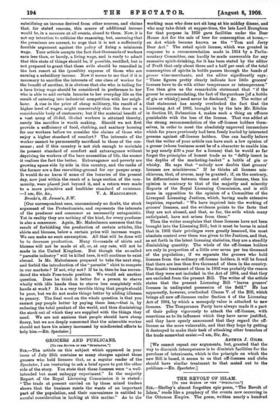GROCERS AND PUBLICANS.
[TO TUB EDITOR or ,rap "SrEoT*Tog."1 Sia,—The article on this subject which appeared in your issue of July 25th contains so many charges against those grocers who hold licenses that, as a regular reader of the Spectator, I am venturing to ask a brief space to put the other side of the story. You state that these licenses were "a well- intended but most unhappy experiment." In the majority Report of the Royal Licensing Commission it is stated : "The trade at present carried on by these mixed traders shows that the business meets the wants of an important part of the population, and their convenience is entitled to careful consideration in looking at this matter." As to the working man who does not sit long at his midday dinner, and who may take drink at supper-time, the late Lord Brougham for that purpose in 1830 gave facilities under the Beer House Act for the sale of beer for consumption at borne,— an Act which became known as the "Torn and Jerry Beer Act." The retail spirit license, which was granted in response to a recommendation made in 1854 by a Parlia- mentary Committee, can hardly be made answerable for any excessive spirit-drinking, for it has been stated by the editor of Truth that only about three and a half per cent. of the total consumption of spirits in bottle passes through the hands of grocer wine-merchants, and the editor significantly says: "These figures pretty clearly indicate how little grocers' licenses have to do with either temperance or intemperance." You then give us the remarkable statement that "if the grocer be accommodating, the fact of the purchase [of a bottle of gin or whisky] need never be disclosed," Stc. The writer of that statement has surely overlooked the fact that the Licensing Act of 1902, brought in by the late Mr. Ritchie in Section 10, Subsection 4, makes such a thing an offence punishable with the loss of the license. That was added at the strong recommendation of the off-license holders them- selves, in order to meet the absolutely unproved innuendoes which for years previously bad been freely hurled by interested persons against off-license holders. One can hardly believe that the writer of your article can have such a low opinion of a grocer (whose business must be of a character to enable him to pay nearly £30 a year for a license) that he would ao far forget the principles of honest trade as to "deftly insert in the depths of the marketing-basket" a bottle of gin or whisky. He says that "nobody now doubts that grocers' licenses are mischievous." If he thinks all licenses mis- chievous, that, of course, may be granted ; if, on the contrary, he differentiates between these and other licenses, then his opinion is contrary to that of the majority and minority Reports of the Royal Licensing Commission, and is still more in opposition to the opinion of a Committee of the Liverpool Licensing Justices, which, having made extensive inquiries, reported : "We have inquired into the working of grocers' licenses, and the evidence points to the facts that they are not abused, and that, so far, the evils which many anticipated, have not arisen from them."
Then the writer complains that these licenses have not been brought into the Licensing Bill; but it must be borne in mind that in 1902 their privileges were greatly lessened, the most absolute control over them was given to the Justices, and that, as set forth in the latest licensing statistics, they are a steadily diminishing quantity. The whole of the off-license holders are only in proportion of a little over seven per ten thousand of the population ; if we separate the grocers who hold licenses from the ordinary off-license holders, it will be found that there are less than five thousand of them in the country. The drastic treatment of them in 1902 was probably the reason that they were not included in the Act of 1904, and that they are excluded from the present Bill. The writer of the article states that the present Licensing Bill "leaves grocers' licenses in undisputed possession of the field." He has apparently, however, overlooked Clause V. of the Bill, which brings all new off-licenses under Section 4 of the Licensing Act of 1904, by which a monopoly value is attached to new licenses. The Temperance Party have always made it a part of their policy vigorously to attack the off-license, with assertions as to its influence which they have never justified, and they have openly announced that they regard the off- license as the more vulnerable, and that they hope by getting it destroyed to make their task of attacking other branches of the trade somewhat easier.—I am, Sir, Stc., ARTHUR J. Gluts.
[We cannot repeat our arguments, but, granted that the way to diminish intemperance is to diminish facilities for the purchase of intoxicants, which is the principle on which the new Bill is based, it seems to us that off-licenses and clubs should have similar treatment to that meted out to the publican.—ED. Spectator.]


































 Previous page
Previous page